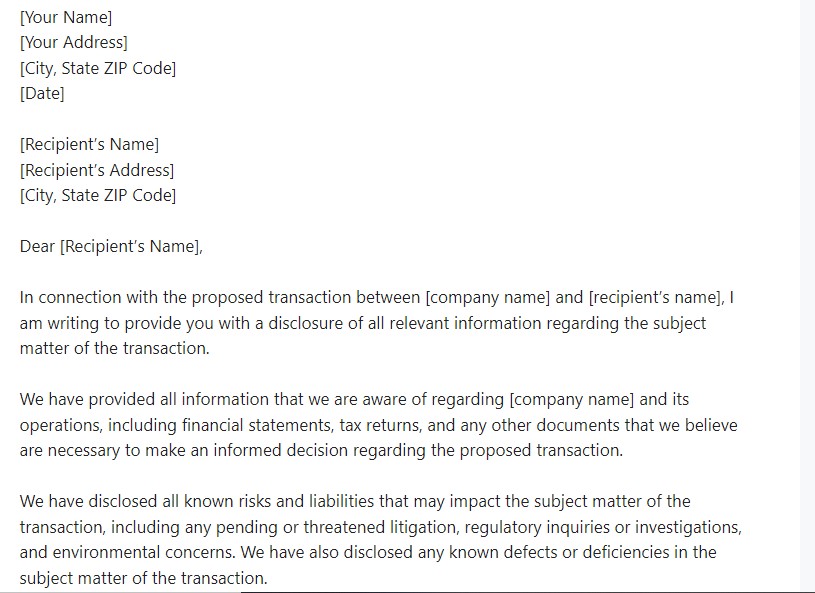A disclosure letter is a document used to provide important information to another party before entering into a transaction, such as the purchase or sale of a business or property. The letter aims to disclose all relevant information about the subject of the transaction so that the other party can make an informed decision.
Here are some frequently asked questions (FAQs) regarding disclosure letters:
Q: What is a disclosure letter?
A: A disclosure letter is a document used to provide important information to another party before entering into a transaction, such as the purchase or sale of a business or property.
Q: Why should I use a disclosure letter?
A: A disclosure letter is used to provide all relevant information to the other party in order to help them make an informed decision about the transaction. It also helps to reduce the risk of legal disputes or liabilities that may arise from undisclosed information.
Q: What should I include in a disclosure letter?
A: A disclosure letter should include all relevant information about the subject of the transaction, such as financial statements, tax returns, any pending or threatened litigation, regulatory inquiries or investigations, environmental concerns, and any known defects or deficiencies.
Q: Do I need a lawyer to write a disclosure letter?
A: While it is not always necessary to have a lawyer write a disclosure letter, it is advisable to seek legal advice if you are unsure about what information should be disclosed or how to word the disclosure.
Q: Can a disclosure letter be used in court?
A: A disclosure letter can be used as evidence in court, and it may be helpful in resolving any disputes that arise from the transaction.
Q: Who should receive a disclosure letter?
A: A disclosure letter should be sent to all parties involved in the transaction, including any attorneys or other advisors who are representing the parties. It is important to ensure that all parties have acknowledged and accepted the terms of the disclosure letter before entering into the transaction.
Here are some tips on how to write a disclosure letter:
1. Identify the parties: Clearly identify the parties involved in the transaction and the subject matter of the transaction.
2. Be comprehensive: Provide a comprehensive list of all information that should be disclosed, including any potential risks or liabilities.
3. Use clear language: Use clear and concise language that is easy to understand, and avoid using technical jargon or legal terminology.
4. Organize the letter: Organize the letter in a logical manner, using headings and subheadings to clearly separate different topics.
5. Seek legal advice: If you are unsure of what information should be disclosed or how to word the disclosure, it is advisable to seek legal advice.
Here is a sample disclosure letter:
[Your Name]
[Your Address]
[City, State ZIP Code]
[Date]
[Recipient’s Name]
[Recipient’s Address]
[City, State ZIP Code]
Dear [Recipient’s Name],
In connection with the proposed transaction between [company name] and [recipient’s name], I am writing to provide you with a disclosure of all relevant information regarding the subject matter of the transaction.
We have provided all information that we are aware of regarding [company name] and its operations, including financial statements, tax returns, and any other documents that we believe are necessary to make an informed decision regarding the proposed transaction.
We have disclosed all known risks and liabilities that may impact the subject matter of the transaction, including any pending or threatened litigation, regulatory inquiries or investigations, and environmental concerns. We have also disclosed any known defects or deficiencies in the subject matter of the transaction.
We have made every effort to ensure that the information provided is accurate and complete, but we make no warranties or representations regarding its accuracy or completeness. We encourage you to conduct your own due diligence and to seek legal and other professional advice before entering into the transaction.
If you have any questions or concerns regarding this disclosure, please do not hesitate to contact us.
Sincerely,
[Your Name]
